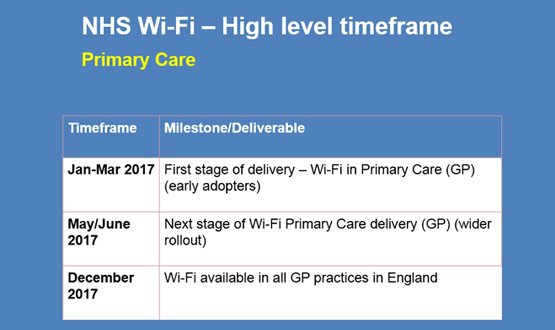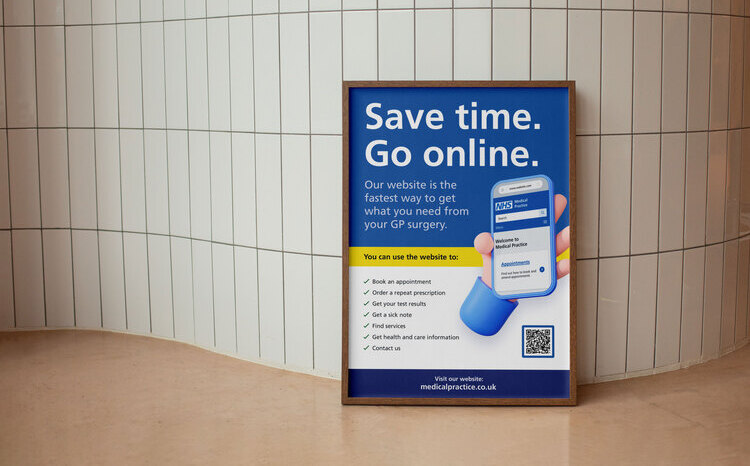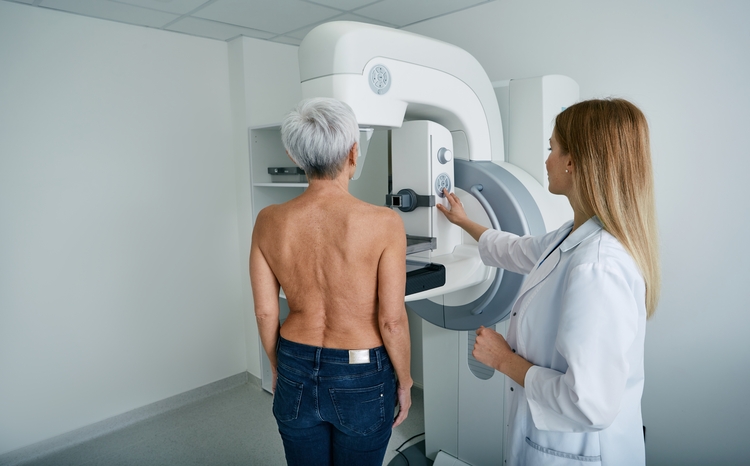Entire NHS estate to have free wifi by 2019
- 27 June 2017

The entire NHS estate will soon be able to access free internet as part of NHS Digital’s Wifi Programme.
It aims to get all GP practices set up by the end of 2017, with hospitals and secondary care to follow in 2018.
The project’s aim is to support health and care professionals to have access to services, tools and technologies to deliver better care – according to a NHS Digital spokeswoman.
The first phase (of the three-step programme) commenced earlier this year with NHS wifi installed in 991 GP practices across England. It allows patients to access the internet free of charge in their GP’s waiting room, via their smart phone or tablet.
“NHS Digital is working to make sure that everyone can access free wifi in NHS sites in England, as set out in the NHS England General Practice Forward View”, an NHS Digital spokeswoman said.
“NHS wifi will provide a secure, stable, and reliable wifi capability, consistent across all NHS settings. It will allow patients and the public to download health apps, browse the internet and access health and care information.”

She said NHS Wifi is a response to patient feedback asking for free wifi services to be introduced in NHS locations.
In 2015, the health secretary, Jeremy Hunt announced that free wifi will be available across all NHS buildings in England as part of the government’s commitment to a paperless health service by 2020.
In April 2016, the National Information Board started to lay out the timetable for delivering on Hunt’s promise. At the board meeting, Tom Denwood, the national provider support and integration director at NHS Digital, said that by March 2018, there would be a firm target in place to meet the commitment, with GPs having free wifi in place by March 2019.
The next stage of the programme is currently underway with a wider roll-out across primary care.
Clinical commissioning groups (CCGs) will get funding to implement the NHS Wifi in general practices based on a calculation of GP surgery size.
“CCGs can procure wifi services on behalf of GP practices in their areas through established frameworks including the Crown Commercial Services Framework”, the spokeswoman said.
The 20 CCGs who hope to implement wifi across GP practices within their areas, by the end of March 2017 can be found here.
The spokeswoman said it will be available in primary locations more quickly than secondary care as the estate requirements are less complicated than in hospitals.
The internet access will be granted through an NHS.UK landing page which will host national healthcare information alongside locally generated content from the general practice or CCG, such as information about local clinics and health services.





6 Comments
Meris,
1. The NHS tries to be evidence-based.
2. The WiFi is already there for staff use – just not accessible to the patients.
“Digital health?!” While we are trying to get Wi-Fi out of doctors’ offices and medical centers in Switzerland, the British National Health Service is ensuring Wi-Fi will be installed everywhere – in hospitals and care centers. Electrosensitve persons will have no where to go to receive medical care. Medical personnel will be working all day in an environment saturated with a 2B carcinogen, and vulnerable patients: pregnant women, children and sick people will be exposed to radiation in waiting rooms and doctors’ offices, further aggravating their health conditions.
I remember agitating for this at Guy’s Hospital back in 2007, as it was already a no brainer then, and most of the necessary infrastructure was already in place. The necessary focus on security that would then have happened might well have meant that the NHS IT network (people and machines) as a whole would have been better placed to cope with the sort of ‘attacks’ that are happening now.
On the contrary James – I predict that this will hugely improve patients’ ability to manage their own treatment, whether in primary or secondary care. Especially as ore of us use things like patientview.org or the systmonline.tpp-uk.com type of access to GP services. All the ‘luxuries’ whether social media access, or keeping up with work in a way that’s not dependent on myriad unreliable services while at a GP or a Hospital all go to helping to feel less hassled or stressed while being treated. Who knows, it might even reduce a bit of the white coat syndrome.
Lets hope the ‘landing page’ has https with current certificate. Currently, local hospital has insecure initial access, so that google chrome refuses to permit connection as insecure.
I really struggle to see why this is a priority for the NHS at the moment. Sure we can do it, but surely we should be spending money on things which directly improve care and treatment of patients rather than this sort of thing which is a bit of a luxury. I am rather doubtful that there are many people whose only means of accessing the Internet will be from NHS provided wifi, and there are of course loads of other free providers out there including coffee shops. supermarkets etc.
Why don’t we focus on doing our core business rather then replicating what others are doing?
Comments are closed.